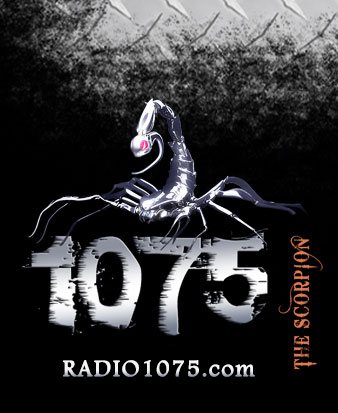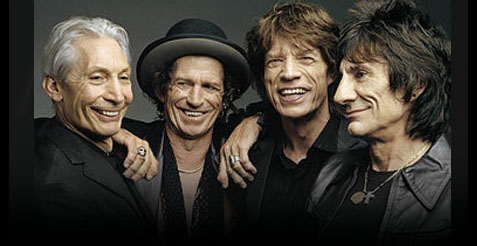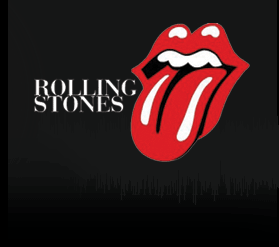

 |
 |
 |

  |
||
Members Mick Jagger • Keith Richards • Charlie Watts • Ron Wood The Rolling Stones became popular during the "British Invasion" in the early 1960s.The band was formed in London in 1962 by original leader Brian Jones, but eventually led by the songwriting partnership of singer Mick Jagger and guitarist Keith Richards. Pianist Ian Stewart, drummer Charlie Watts and bassist Bill Wyman completed the early lineup. Their image of unkempt and surly youth is one that many musicians still emulate. Jones died in 1969 shortly after being fired from the band and was replaced by 20-year-old Mick Taylor. After Taylor quit in 1974, former Faces guitarist Ron Wood took over. Wyman retired in 1993 being replaced by Darryl Jones. The band have released 55 albums of original work and compilations, and have had 32 U.K & U.S top-10 singles.They have sold more than 200 million albums worldwide.1971's Sticky Fingers began a string of eight consecutive studio albums at number one in the United States. In 1989 the Rolling Stones were inducted into the American Rock and Roll Hall of Fame, and in 2004 they were ranked number 4 in Rolling Stone magazine's 100 Greatest Artists of All Time in the USA.Their latest album, A Bigger Bang, was released in 2005 and accompanied by their highest-grossing tour, which lasted into late summer 2007. During the 1969 American tour, tour manager Sam Cutler introduced them as "The Greatest Rock and Roll Band in the World". In 1951 Keith Richards and Mick Jagger met while attending Wentworth County Junior School.In 1960, the two became reacquainted while Richards was attending Sidcup Art College. During the first American tour in June 1964, the Stones began years of recording exclusively at American studios Chess Studios in Chicago and RCA Studios in Los Angeles.The Stones' version of “Little Red Rooster,” which went to number 1 in the UK, was banned in the US because of its “objectionable” lyrics. Oldham crafted the band's image of long-haired tearaways "into the opposite to what the Beatles [were] doing" .The Stones also appeared on American variety shows such as The Ed Sullivan Show Sullivan reacted to the pandomonium the Stones caused and promised to never book them again, though he later did book them repeatedly . The first Jagger/Richards composition at number 1 in the UK was "The Last Time" in early 1965. The U.S. version of that year's Out of Our Heads LP contained seven original songs, including "(I Can't Get No) Satisfaction" which became the band's first number one in the US where it remained for four weeks in July, and established the Stones as a premier act. Shortly thereafter they released their second number one, "Get Off of My Cloud".[1] Out of Our Heads and the US-only released December's Children were also the last Stones albums to predominantly feature covers. December 1967 saw the release of Their Satanic Majesties Request ,released shortly after the Beatles' Sgt. Pepper's Lonely Hearts Club Band.Satanic Majesties was recorded in difficult circumstances while Jagger, Richards and Jones were in and out of jail. (Bill Wyman wrote and sang a track on the album — "In Another Land" — and the front cover of the album had a kaleidoscope picture.) Jagger was a strong advocate of the psychedelic sound of the album, but rarely have any songs from the record been played live. Though the band has released psychedelic tracks, Satanic Majesties is an anomaly. By the release of Beggars Banquet Brian Jones had contributed sporadically and was more troubled. Jagger said that Jones was "not psychologically suited to this way of life."His drug use had become a hindrance, and he was unable to obtain a U.S. visa. In a June meeting at Jones' house between Jagger, Richards, Watts, Richards said that Jones admitted that he couldn't "go on the road again." All agreed to let Jones, according to Richards, "...say I've left, and if I want to I can come back.'"His replacement was the 20-year-old guitarist Mick Taylor, of John Mayall's Bluesbreakers, who started recording with the band immediately. In less than a month at his Cotchford Farm home in Sussex, Jones drowned in his pool. The release of Let It Bleed came in December. Their last album of the Sixties, Let It Bleed featured "Gimme Shelter", "You Can't Always Get What You Want", "Midnight Rambler", as well as a cover of Robert Johnson's "Love in Vain". Most of these songs became part of the live show for the resulting tour of America, their first in three years. Making their way from New York to California, the tour culminated with the band's staging of the Altamont Free Concert, at the disused Altamont Speedway, about 60km east of San Francisco. The concert was a disaster, due in part to the hiring of Hell's Angels to undertake security. Meredith Hunter, a young man, was stabbed and beaten to death by the Angels.[15] The tour and "Altamont" were documented in Albert and David Maysles' film Gimme Shelter. As a response to the growing popularity of bootleg recordings, the live album Get Yer Ya-Yas Out! was released in 1970 and was considered by critic Lester Bangs the best live record ever. Sticky Fingers continued the band's immersion into heavily blues-influenced compositions. Some tracks (including "Brown Sugar" and "You Gotta Move") were recorded at Alabama's Muscle Shoals Sound Studio during the 1969 American tour. Nearing the end of 1974, Taylor began to get impatient because there had been no tours since October 1973.The band found itself in a stalemate, with members opting to spend time abroad between recording sessions, while Jagger was getting exasperated with Richards, who was becoming more unpredictable. The other members of the band ended up paying the fines and legal bills resulting from Richards' convictions, which led to the band being denied entry to certain countries and to missed income for all. Taylor spent his time helping Jagger compose and record songs in the studio, while Richards was often absent. Jagger promised Taylor recognition for his contributions in the form of official credits on tracks. When this did not happen, and with no tour in sight by the end of 1974 and a recording session already booked in Munich to record another album, Taylor quit The Rolling Stones. The Stones used the recording sessions in Munich to audition replacements for Taylor. Guitarists as stylistically far-flung as Humble Pie lead Peter Frampton and ex-Yardbirds virtuoso Jeff Beck were auditioned. American session players Wayne Perkins and Harvey Mandel appeared on much of the album, but at Jagger's insistance the band settled on Ron Wood. Wood had already recorded and played live with Richards and already contributed to the recording and writing of It's Only Rock 'n Roll. The album, Black and Blue (UK 2; US 1) (1976), featured all their contributions. Though he initially declined Jaggers offer to become a full member of the Stones because of his ties to the The Faces, Wood comitted to the Stones in 1974. At the insistance of Wyman and Watts, Wood was eventually made a full member in the 80's. Entering the 1980s on a renewed commercial high due to the success of Some Girls, the band released its next album Emotional Rescue in mid-1980. The recording of the album was reportedly plagued by turmoil, with Jagger and Richards' relationship reaching a new low. Richards, more sober than during the previous ten years, began to assert more control in the studio — more than Jagger had become used to and a struggle ensued and clashes were rife. Though Emotional Rescue hit the top of the charts on both sides of the Atlantic, it was panned as lackluster and inconsistent . Following a boggled (due to an extremely drunken Richards press conference to announce the album's release, the group decided not to tour in support of the album . In early 1989, The Rolling Stones, including Mick Taylor, Ronnie Wood and Ian Stewart (posthumously), were inducted into the American Rock and Roll Hall of Fame. Jagger and Richards appeared to have developed a new understanding and they recorded an album as The Rolling Stones, which became Steel Wheels. Heralded as a return to form, it included the singles "Mixed Emotions", "Rock and a Hard Place" and "Almost Hear You Sigh". After the successes of Steel Wheels/Urban Jungle tours, the band took a break. Charlie Watts released two jazz albums; Ronnie Wood made his fifth solo album, the first in 11 years, called Slide On This; Keith Richards released his second solo album in late 1992, Main Offender and did a small tour including big concerts in Spain and Argentina. Mick Jagger got good reviews and sales with his third solo album Wandering Spirit. The album sold more than two million copies worldwide. After Wyman's departure, the Stones' new distributor/record label, Virgin Records, remastered and repackaged the band's back catalogue from Sticky Fingers to Steel Wheels without the three live albums, and issued another hits compilation in 1993 entitled Jump Back . By 1993 the Stones set upon their next studio album. Watts chose Darryl Jones, former sideman of Miles Davis and Sting, as Wyman's replacement for 1994's Voodoo Lounge . The album met strong reviews and sales, going double platinum in the US. Reviewers took note of the album's "traditionalist" sounds, which were credited to the Stones' new producer Don Was.It would go on to win the 1995 Grammy Award for Best Rock Album. In late 2001, Mick Jagger released his fourth solo album Goddess in the Doorway,which met mixed reviews, while Jagger and Richards took part in "The Concert for New York City", performing "Salt of the Earth" and "Miss You". In 2002, the band announced the Licks Tour and released Forty Licks,a greatest hits album that contained four new songs recorded with the latter-day core band of Jagger, Richards, Watts, Wood, Leavell and Jones. On July 26, 2005, Jagger's birthday, the band announced the name of their new album, A Bigger Bang ,which was released on September 6 to strong reviews, including a glowing write-up in Rolling Stone.The album included the most controversial song from the Stones in years, "Sweet Neo Con", a criticism of American Neoconservatism from Jagger. The song was reportedly almost dropped from the album due to objections from Richards, who prefers to avoid overtly political or topical songs because he believes such songs rarely stand the test of time. The subsequent A Bigger Bang Tour began in August 2005, and visited North America, South America and East Asia. In February 2006, the group played the half-time show of Super Bowl XL in the USA. By the end of 2005, the Bigger Bang tour set a record of $162 million in gross receipts, breaking the North American mark also set by the Stones in 1994. Later that month, the band played to a claimed 1.5 million on the Copacabana beach in Rio de Janeiro in a free concert. After performances in New Zealand, Keith Richards went to hospital on May 2006 for brain surgery after a dubious "fall from a coconut tree"on Fiji, causing a six-week postponement of the European leg of the tour. On June 10, 2007, the band performed their first gig at a festival in 30 years, at the Isle of Wight Festival, to a crowd of 50,000. On August 26, 2007 they played their last concert of the A Bigger Bang Tour. Studio albums UK Studio albums US studio albums Studio albums Live albums Compilations |
||
|
|
